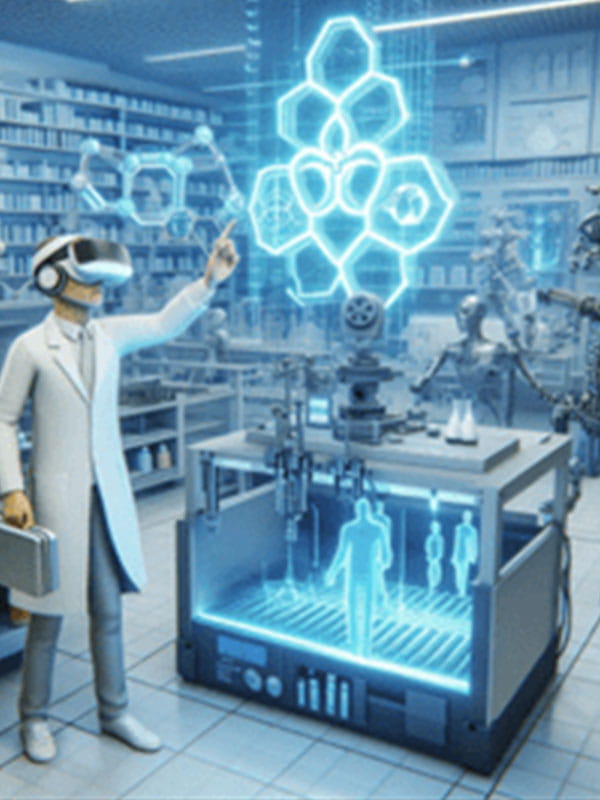10 New skills for managers
The chemical industry is undergoing a significant transformation. The advent of digital technologies is changing the way businesses operate, creating new opportunities and challenges. This transformation is not just about replacing old technologies with new ones, but about becoming a data-driven organisation. It’s a strategic initiative that incorporates digital technology across all areas of an organisation.

Digital transformation in the chemical industry involves several stages:
1. Early Stage: This includes planning, cultivating necessary partnerships, and testing the organisation’s capabilities.
2. Mid-stage: Business leaders choose focus areas like business processes, digital products, or key roles within the organisation.
3. Growth Stage: The organisation starts to see the benefits of the transformation.
4. Mature Stage: The transformation is complete, and the organisation continues to evolve with the digital landscape.
In this context, the role of managers is evolving. They need to acquire new skills to be successful in this digital transformation. Here are some key skills that an overall manager looking to select and introduce a digital application in their factory or chemical industry would need:
1. Understanding of Digital Technologies: The manager should have a basic understanding of different digital technologies. This will help them understand the capabilities of different digital applications and how they can be leveraged in a chemical industry setting.
2. Data Analysis: Since most digital applications generate a lot of data, the ability to analyse and interpret this data is important. This can help in making informed decisions.
3. Cybersecurity: With the increasing use of digital applications, cybersecurity has become a major concern. The manager should understand basic cybersecurity principles to ensure the safe use of the digital application.
4. Data and Analytics Translator Skills: The ability to communicate effectively with technical teams (like software developers, data scientists, IT support) is crucial. This can help in customising the application to suit the specific needs and resolving any technical issues that may arise. Read more here.
5. Data Governance and Basic Digital Architecture Concepts: The manager should also have a good understanding of the company’s digital framework for collecting, storing, managing, and protecting clients’ information.
6. Digital Technology Supplier Assessment: Skills in assessing and selecting vendors are needed when choosing a digital application. This includes understanding how to evaluate digital reliability, digital support services and SLA (ITIL based e.g.), and the scalability of their product.
7. Digital Maturity Assessment: Understanding digital maturity models can help a manager assess the current state of digital adoption in their factory and identify areas for improvement. Tools like the Digital Maturity Model (DMM) or Digital Transformation Maturity Model (DTMM) can provide a structured approach to this assessment. These tools typically evaluate various aspects such as strategy and culture, customer experience, operations and technology, and data and analytics.
8. Software Engineering Processes: If the digital application needs to be customized or developed from scratch, knowledge of software engineering processes becomes essential. This includes understanding of requirements gathering, design and architecture, coding and development, testing, deployment and maintenance, and agile methodologies.
9. Digital Regulations and European Acts: An overall manager who wants to introduce a digital application in their factory needs to have a comprehensive understanding of several key areas of legal knowledge and digital regulations. Examples are the GDPR act that dictates how consumer data is collected, used, and secured. The Network and Information Security (NIS) Directive, also known as NIS 2.0, requires stringent cybersecurity measures and the AI European Regulation Act demands transparency obligations.
10. Inclusivity: As a result of the digitalisation, teams often span different geographies and time zones. Managers need to be adept at leading virtual teams, which involves unique challenges such as building trust without face-to-face interaction, managing different time zones, and using digital tools for communication and collaboration. Diversity, including but not limited to nationality, digital literacy, educational background, can bring a wide range of perspectives and drive innovation. Managers need to be skilled at leveraging the benefits of diversity while mitigating potential issues. This involves fostering an inclusive culture, promoting open communication, and understanding and respecting cultural differences.
In conclusion, the digital transformation of the chemical industry demands new skills from managers. These skills are not just about understanding technology, but about leading change, making data-driven decisions, and navigating the complex legal landscape of the digital world. Managers who can acquire these skills will be well-positioned to lead their organizations into the future.
